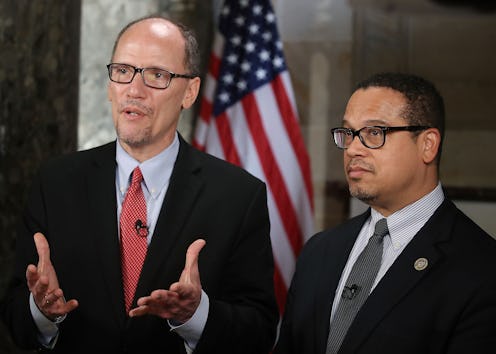News
Why A Local Delaware Election Gives Democrats Hope

Donald Trump's election appears to have sparked a surge in enthusiasm among the grassroots movements on the left. Between protests and marches in the streets, direct engagement at town halls across the country, and even boycotts of certain brands, it's clear that many Democrats and liberals are fired up after a blistering loss in November. But with Republicans in control of both houses of Congress and the presidency, what really matters for Democrats is whether they can harness that energy and use it to win elections.
After the 2016 presidential elections, the next contests for federal office countrywide come in the Congressional midterms in 2018. But in the meantime, Democrats are focused on state and local-level elections they may have a shot of winning. Last week, Democrats held onto seats in legislative bodies in Delaware and and Connecticut special elections, giving them continued full control of both states' governments. They were seats that Democrats were already favored to win, but through an energized grassroots, and active support from Democrats countrywide, they turned normal victories into blowouts with turnout that eclipsed normal state races.
For example, Stephanie Hansen won her Delaware State Senate with more than 58 percent of the vote in a district that went to the Democrats by only two percentage points in its last election in 2014. More than a thousand more Democrats came out to vote than in the previous election.
As the first truly close special election for Democrats since Trump's election — and one that could have switched control of the Delaware state house if Hansen lost — it became a trial ground for the tactics these groups are using to get activists involved in elections.
"All of a sudden there was this new groundswell of people," Erik Raser-Schramm, who managed Hansen's campaign, tells Bustle. Raser-Schramm attributes the massive win to how the "tone of the campaign was different after Trump was sworn in." He believes it became a referendum on his presidency, and his version of the Republican party. "People are angry with what's happening in DC," he says.
For activists all over the United States looking for a way to fight back against Trump, Delaware was in the lime light. Groups like Flippable – which aims to highlight races around the country that are close enough that they could flip red to blue (hence the name) — and Sister District —which allows activists in safe districts to get involved in specific races that are more swingable — got involved, raising money and helping find volunteers for the campaign.
As the first truly close special election for Democrats since Trump's election — and one that could have switched control of the Delaware state house if Hansen lost — it became a trial ground for the tactics these groups are using to get activists involved in elections.
"Stephanie didn't have to fundraise," says Raser-Schramm. Unlike many candidates, "she didn't spend much time on fundraising calls. She was out knocking on doors from 11 AM until dark."
Between Flippable and Sister District, over $145,000 was raised for Hansen's campaign, a massive sum for such a small election.
"In Delaware, this was such a great example of the nation rallying behind a great candidate," Catherine Vaughan, founder of Flippable, tells Bustle. The group focused on getting the word out to make fundraising and volunteering happen early, when it could have the most impact in the race.
There can be danger in local races like this one of outside money and outside support making a candidate look like an outsider themselves. But Raser-Schramm and the outside groups say that focusing on local impact made it work, as did the fact that the fundraising was from small donors — over 12,000 of them nationwide — not big money. Moreover, though Sister District organized campaign volunteers to be bused in from New York City and other heavily Democratic areas to help with the race, the campaign made sure to keep only in-state volunteers handling the phone-banking.
The Democratic party is hoping to capture this kind of fire in other elections around the country. Over the past eight years, Democrats lost control of state houses around the country and are now at one of their lowest points in decades.
"Policies of Republicans writ large are going to continue to motivate voters to come out and get things done."
But the Democratic Legislative Campaign Committee — the arm of the Democratic party that focuses on local and state races — sees the special election in Delaware last week, as well as others such as the ones in Connecticut last Tuesday (Democrats won seats they expected to win by big margins, and kept a Republican seat close) as signs of something to come.
"They're really exciting and inspiring indicators of what Democrats can look forward to in the future," Carolyn Fiddler, National Communications Director for the DLCC, tells Bustle. "There's a real opportunity for Dems to become aware of how crucial state legislative elections are."
"They’re not just marching. They’re looking for engagement."
The hope is that the kind of grassroots activism that turned out voters in Delaware and Connecticut will be useful again in pushing two blue states into unified Democratic control.
"Policies of Republicans writ large are going to continue to motivate voters to come out and get things done," says Fiddler, who believes that having Trump in the White House will only increase the enthusiasm among not just the Democratic base. "They’re not just marching. They’re looking for engagement."